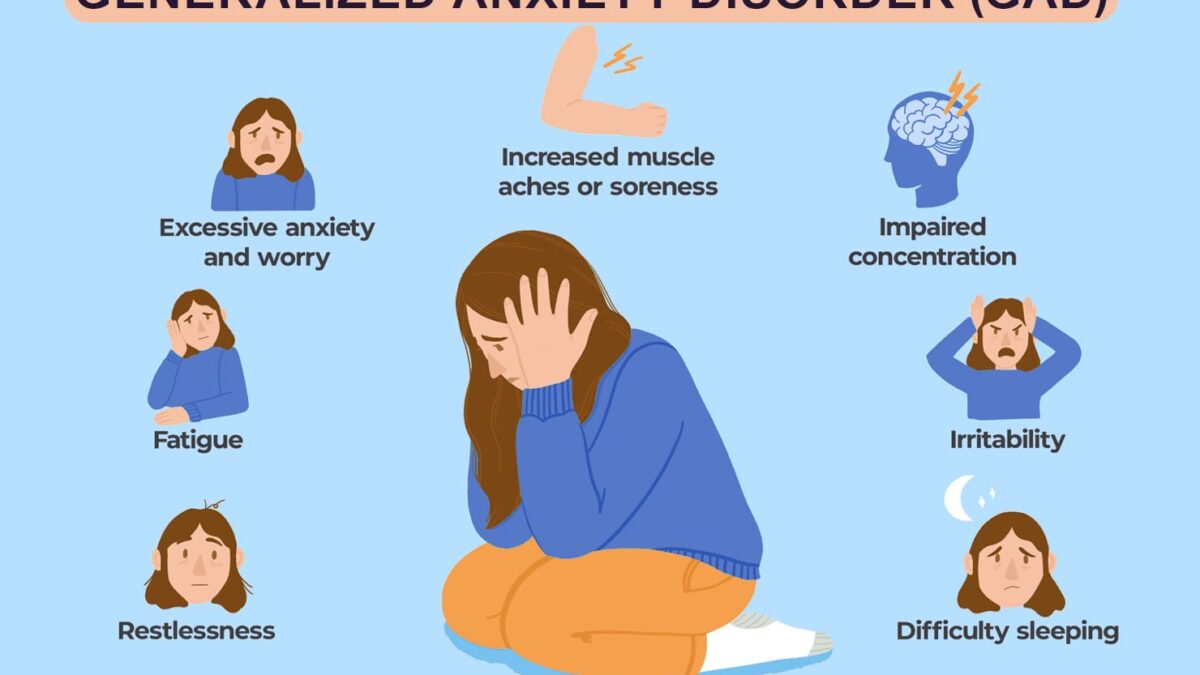Psychological anxiety disorders are a group of mental health conditions that are characterized by excessive and persistent anxiety, fear, and worry. These disorders can have a significant impact on an individual’s quality of life, as they can interfere with their ability to function in everyday life. In this essay, we will discuss some of the most common psychological anxiety disorders, including generalized anxiety disorder (GAD), panic disorder, obsessive-compulsive disorder (OCD), and post-traumatic stress disorder (PTSD).
Common Psychological Anxiety Disorders:
Generalized Anxiety Disorder (GAD)
Generalized anxiety disorder is a Psychological Anxiety Disorder that is characterized by excessive and persistent worry and anxiety about various life events, such as work, relationships, and health. People with GAD often feel anxious most of the time and find it difficult to control their worries. Physical symptoms, such as muscle tension, fatigue, and headaches, may also be present. GAD affects approximately 3-5% of the population, and it is more common in women than in men.
Panic Disorder
Panic disorder is a psychological anxiety disorder that is characterized by sudden and unexpected panic attacks, which are intense episodes of fear and physical symptoms, such as chest pain, sweating, and shortness of breath. Panic attacks can be so severe that people may feel like they are having a heart attack or dying. Panic disorder affects approximately 2-3% of the population, and it is more common in women than in men.
Obsessive-Compulsive Disorder (OCD)
Obsessive-compulsive disorder is a psychological anxiety disorder that is characterized by persistent and intrusive thoughts, images, or impulses (obsessions) that are distressing, and repetitive behaviors or mental acts (compulsions) that are intended to neutralize the anxiety caused by the obsessions. The compulsions are often time-consuming and interfere with everyday activities. OCD affects approximately 1-2% of the population, and it affects men and women equally.
Post-Traumatic Stress Disorder (PTSD)
Post-traumatic stress disorder is a psychological anxiety disorder that can develop after experiencing or witnessing a traumatic event, such as a natural disaster, physical or sexual assault, or military combat. Symptoms of PTSD include intrusive memories or flashbacks of the event, avoidance of reminders of the event, negative changes in mood and cognition, and increased arousal and reactivity. PTSD affects approximately 3.5% of the population, and it is more common in women than in men.
Causes of Psychological Anxiety Disorders
The exact causes of psychological anxiety disorders are not fully understood, but they are likely to be a combination of genetic, environmental, and psychological factors. Genetics may play a role in the development of anxiety disorders, as they tend to run in families. Environmental factors, such as traumatic life events, stress, and substance abuse, can also trigger anxiety symptoms. Psychological factors, such as personality traits and coping strategies, can also contribute to the development of anxiety disorders.
Treatment of Psychological Anxiety Disorders
Treatment for psychological anxiety disorders can include medication, psychotherapy, or a combination of both. Medications, such as selective serotonin reuptake inhibitors (SSRIs) and benzodiazepines, can help reduce anxiety symptoms. Psychotherapy, such as cognitive-behavioral therapy (CBT) and exposure therapy, can help individuals learn coping strategies and overcome their fears. Eye movement desensitization and reprocessing (EMDR) therapy is also a promising treatment for PTSD. Lifestyle changes, such as regular exercise, a healthy diet, and stress-reduction techniques, can also help manage anxiety symptoms.
Therapy:
Psychotherapy, or talk therapy, can help individuals with anxiety disorders identify and manage their symptoms. Cognitive-behavioral therapy (CBT) is a common approach, which involves identifying and changing negative thought patterns and behaviors.
Medication:
Antidepressants, anti-anxiety medications, and beta-blockers can help manage symptoms of anxiety. These medications may be prescribed by a doctor or psychiatrist.
Lifestyle changes:
Regular exercise, a healthy diet, stress-reduction techniques (such as meditation or yoga), and getting enough sleep can all help manage anxiety symptoms.
Support groups:
Support groups can provide a sense of community and understanding for individuals with anxiety disorders. They can also offer coping strategies and emotional support.
Alternative therapies:
Some individuals may benefit from alternative therapies, such as acupuncture, massage, or herbal remedies. However, it’s important to talk to a doctor before trying any alternative treatments.
The best treatment plan for an individual with an anxiety disorder will depend on the type and severity of their symptoms, as well as their personal preferences and medical history. It’s important for individuals with anxiety disorders to seek professional help and support, as these conditions can be debilitating and interfere with daily functioning.
Conclusion
Psychological anxiety disorders are a group of mental health conditions characterized by persistent feelings of fear, worry, and unease. These disorders can range from mild to severe, and can significantly impact a person’s quality of life. Common anxiety disorders include generalized anxiety disorder, panic disorder, social anxiety disorder, and specific phobias.
The causes of anxiety disorders are complex and can be influenced by a range of factors, including genetics, life experiences, brain chemistry, medical conditions, substance abuse, and personality traits. Treatment for anxiety disorders typically involves a combination of medication, therapy, and lifestyle changes.
It’s important for individuals with anxiety disorders to seek professional Psychiatrist in Sugar Land Texas help and support, as these conditions can be debilitating and interfere with daily functioning. With proper treatment and support, many people with anxiety disorders can learn to manage their symptoms and improve their overall quality of life.


